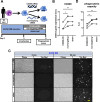Impaired synaptosome phagocytosis in macrophages of individuals with autism spectrum disorder
- PMID: 40185900
- PMCID: PMC12240830
- DOI: 10.1038/s41380-025-03002-3
Impaired synaptosome phagocytosis in macrophages of individuals with autism spectrum disorder
Abstract
Dendritic spine abnormalities are believed to be one of the critical etiologies of autism spectrum disorder (ASD). Over the past decade, the importance of microglia in brain development, particularly in synaptic elimination, has become evident. Thus, microglial abnormalities may lead to synaptic dysfunction, which may underlie the pathogenesis of ASD. Several human studies have demonstrated aberrant microglial activation in the brains of individuals with ASD, and studies in animal models of ASD have also shown a relationship between microglial dysfunction and synaptic abnormalities. However, there are very few methods available to directly assess whether phagocytosis by human microglia is abnormal. Microglia are tissue-resident macrophages with phenotypic similarities to monocyte-derived macrophages, both of which consistently exhibit pathological phenotypes in individuals with ASD. Therefore, in this study, we examined the phagocytosis capacity of human macrophages derived from peripheral blood monocytes. These macrophages were polarized into two types: those induced by granulocyte-macrophage colony-stimulating factor (GM-CSF MΦ, traditionally referred to as "M1 MΦ") and those induced by macrophage colony-stimulating factor (M-CSF MΦ, traditionally referred to as "M2 MΦ"). Synaptosomes purified from human induced pluripotent stem cell-derived neuron were used to assess phagocytosis capacity. Our results revealed that M-CSF MΦ exhibited higher phagocytosis capacity compared to GM-CSF MΦ, whereas ASD-M-CSF MΦ showed a marked impairment in phagocytosis. Additionally, we found a positive correlation between phagocytosis capacity and cluster of differentiation 209 expression. This research contributes to a deeper understanding of the pathobiology of ASD and offers new insights into potential therapeutic targets for the disorder.
© 2025. The Author(s).
Conflict of interest statement
Competing interests: Dr. Makinodan received research support from Sumitomo Pharma. Dr. Murayama, Dr. Ichikawa, and Dr. Nagata are employees of Sumitomo Pharma Co., Ltd. The remaining authors declare no conflict of interest.
Figures



References
-
- Gyawali S, Patra BN. Autism spectrum disorder: trends in research exploring etiopathogenesis. Psychiatry Clin Neurosci. 2019;73:466–75. - PubMed
MeSH terms
Substances
Grants and funding
LinkOut - more resources
Full Text Sources
Medical
Research Materials
Miscellaneous

